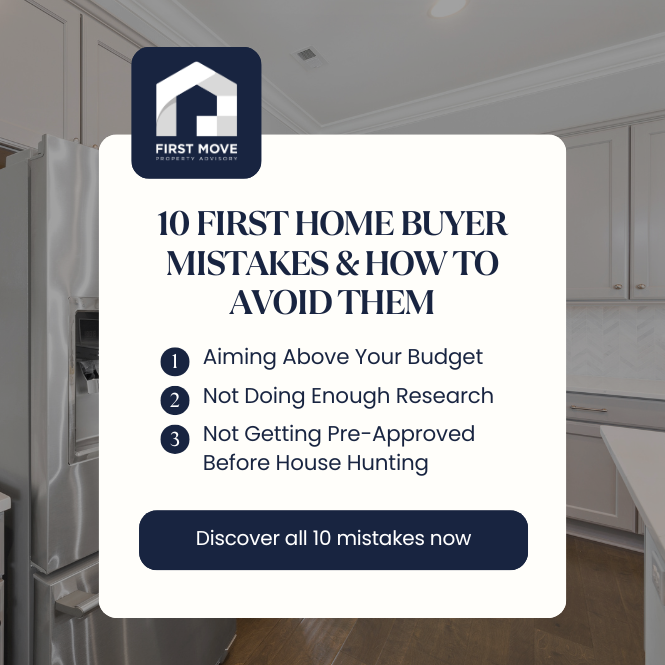Thinking about buying your first home in Melbourne?
Congratulations! Taking that first step toward homeownership is a huge milestone — and it’s an exciting one.
It’s a time full of possibility, but it’s also one of the biggest financial decisions you’ll ever make.
As a Melbourne buyer’s advocate who works closely with first home buyers, I’ve seen how easy it is to make simple (but costly) mistakes — ones that can derail your plans or cost you tens of thousands of dollars.
Often, it comes down to confusion around the property buying process, a lack of guidance, or not knowing what to look out for.
This guide walks you through the 10 most common mistakes first home buyers make — and more importantly, how to avoid them to help you buy with confidence
1. Aiming Above Your Budget
It’s tempting to browse homes just above your budget — especially when properties are underquoted (which is common in Melbourne). Some agents may even encourage you to attend an auction for a home that is not truly within reach, drawing you in emotionally.
But getting attached to a property you can’t afford is not only disheartening — it can also give you false hope for properties that are outside of your budget.
Don’t solely rely on the price guides. Instead, look at recent comparable sales to see what similar homes have actually sold for. This is the best way to understand what your budget can realistically buy — and will help you make smarter, more confident decisions.
2. Not Doing Enough Research
On a macro level, this means knowing the suburb inside and out. Have you actually spent time there? Do you know what the traffic is like during peak hour? What are noise and activity levels like at different times of the day or week? Are there parks, shops, schools, or public transport that suit your lifestyle?
On a micro level:
- Have you checked for easements or restrictive planning overlays?
- Reviewed the contract with a legal professional before making an offer?
- Organised building and pest inspections?
- Factored in stamp duty, insurance, water and council rates, and owners corporation fees (if applicable)?
- Understood how to negotiate clauses and conditions into a contract?
When you’re buying your first home, it’s easy to get swept up in the excitement — but skipping these steps can cost you thousands later. Take the time to get comfortable with the suburb, the street, the property, the contract, and the full costs before making an offer.
3. Not Getting Pre-Approved Before House Hunting
Before you start seriously researching or making offers on properties, make sure you’ve been pre-approved for a home loan.
Getting pre-approval is one of the most important steps for first home buyers — and it can give you a big edge in a competitive property market.
Not only will real estate agents take you more seriously, but you’ll also have a clear understanding of your borrowing power — saving you time by avoiding properties outside your budget
A common mistake we see is buyers only getting pre-approved for less than their full borrowing capacity.
We’re not suggesting you spend to your max loan limit — but you want the option to have more money available than less because if you change your mind it’s much harder to get your pre-approval increased than it is to spend less than your max.
4. Relying on the Media for Property Advice
The media’s job is to grab attention — and the property market makes great clickbait. With dramatic headlines and sweeping generalisations, it’s no surprise that many first home buyers end up feeling confused.
The truth? The property market is local. And the media rarely covers the nuance that matters — like suburb-level trends, street-level demand, or what’s really happening in your price bracket.
Instead of relying on headlines, get your insights from professionals who are on the ground every day:
- Real estate agents know their local patch intimately
- Buyers agents often have access to broader state-wide trends
- Independent research firms like CoreLogic can provide insightful reports
Get your property advice from people in the market — not just those writing about it.
5. Thinking a Bargain Means a Good Buy
It’s possible to find great opportunities on properties that were originally overpriced and didn’t sell due to poor marketing. But in general, homes that sit on the market for a long time with little buyer interest and significant price drops are rarely hidden gems.
Just because a property looks cheap for the area — or is marketed as a “bargain property” — doesn’t mean it’s a smart buy.
If a home seems like a bargain, there’s often a reason — and it’s usually something that will impact liveability, rental appeal, or resale value. Things like poor layout, location issues, noise, or unappealing surrounds are hard to fix — and they tend to keep future buyers away, too.
6. Making a FOMO Purchase
Buying a home — especially one you’ll live in and possibly raise a family in — is always going to be emotional. And that’s okay. In fact, a little emotion can help guide you toward a property that truly suits your lifestyle and long-term goals.
But emotion becomes a problem when it overrides logic — leading to overpaying for a property or skipping critical steps in your due diligence.
FOMO is a very real driver, especially in fast-moving markets with high demand. We’ve heard stories of buyers making huge offers without even inspecting the property — simply because they’re exhausted from constantly searching, only to be outbid again and again.
We get it — the exhaustion is real. But panic-buying is rarely the right move.
Instead of overpaying, focus on building relationships with local agents. That way, you’ll be among the first to hear about new listings — or even access pre-market and off-market opportunities. It gives you time to do your due diligence and act confidently, either before the first open or as soon as it hits the market.
7. Forgetting the Agent Works for the Seller, Not You
Some selling agents are genuinely lovely people — and the really skilled ones can make you feel like they’re on your side. But it’s important to remember: they work for the seller, not you.
A selling agent has a legal responsibility to act in the best interests of their client — and that means getting the highest possible price for the property.
If you’re not experienced in real estate negotiations, our recommendation is to keep some of your cards close to your chest and not reveal your maximum offer.
If you want someone genuinely on your side, consider working with a buyer’s advocate — someone who independently represents your interests, not the seller’s.
8. Not Meeting the Market with a Realistic Offer
Hesitation — or trying to get a “bargain” — can actually cost you more if you’re not meeting the market, or staying ahead of where it’s heading.
Here’s a common scenario:
You’ve been researching a suburb and know that properties like the one you want are selling for around $800k. You attend an open home with lots of interest. Later, the agent calls and says: “We’ll likely have a few offers — are you interested in making one?”
You like the property, and you’re ready to buy. Thinking you’re being a savvy negotiator, you offer $790k. The agent replies, “We have a similar offer — would you like to increase?”
You go up to $795k, still trying to “negotiate,” but the property sells for $800k — right in line with market value. You miss out.
A few weeks later, you find a similar home. But now the market has moved, and these properties are selling for $810k. This time, worried about missing out again, you offer $820k and secure it. In trying to save $5,000, you ended up spending $20,000 more.
9. Getting Stuck in Analysis Paralysis
Hesitation can come at a cost — especially in fast-moving markets, and right now, several Melbourne suburbs fall into this category.
As a buyers advocate in Melbourne, we’ve worked with many first home buyers who feel paralysed when it comes to making an offer — holding out in case a “better” or cheaper property comes along next week. But in a competitive or rising market, that mindset can leave you stuck.
It’s easy to keep researching for months — or even years — only to get priced out of the suburb you originally wanted, and pushed further out as prices rise.
In our experience working with long-term investors and home buyers across Melbourne, one truth stands out: Imperfect action beats perfect inaction.
10. Thinking You Need A 20% Deposit to Buy a Home
I hear it all the time — friends saying it’s impossible to buy a house because it’ll take them years to save a deposit.
While saving a full 20% is ideal (and can reduce your repayments), the truth is, you don’t always need a 20% deposit to buy your first home.
Thanks to government grants and first home buyer support schemes, some buyers can get into the market with as little as 2% deposit, and in some cases, without paying stamp duty.
If you’re serious about buying, we recommend speaking with a mortgage broker once you’ve saved around 5% of your ideal purchase price. They can help you understand your borrowing power, explore your options, and set up a realistic savings plan to get you on track.
Don’t wait years thinking you’re not ready — get clarity early and start your journey sooner. If you need a mortgage broker, we can introduce you to someone we trust.

